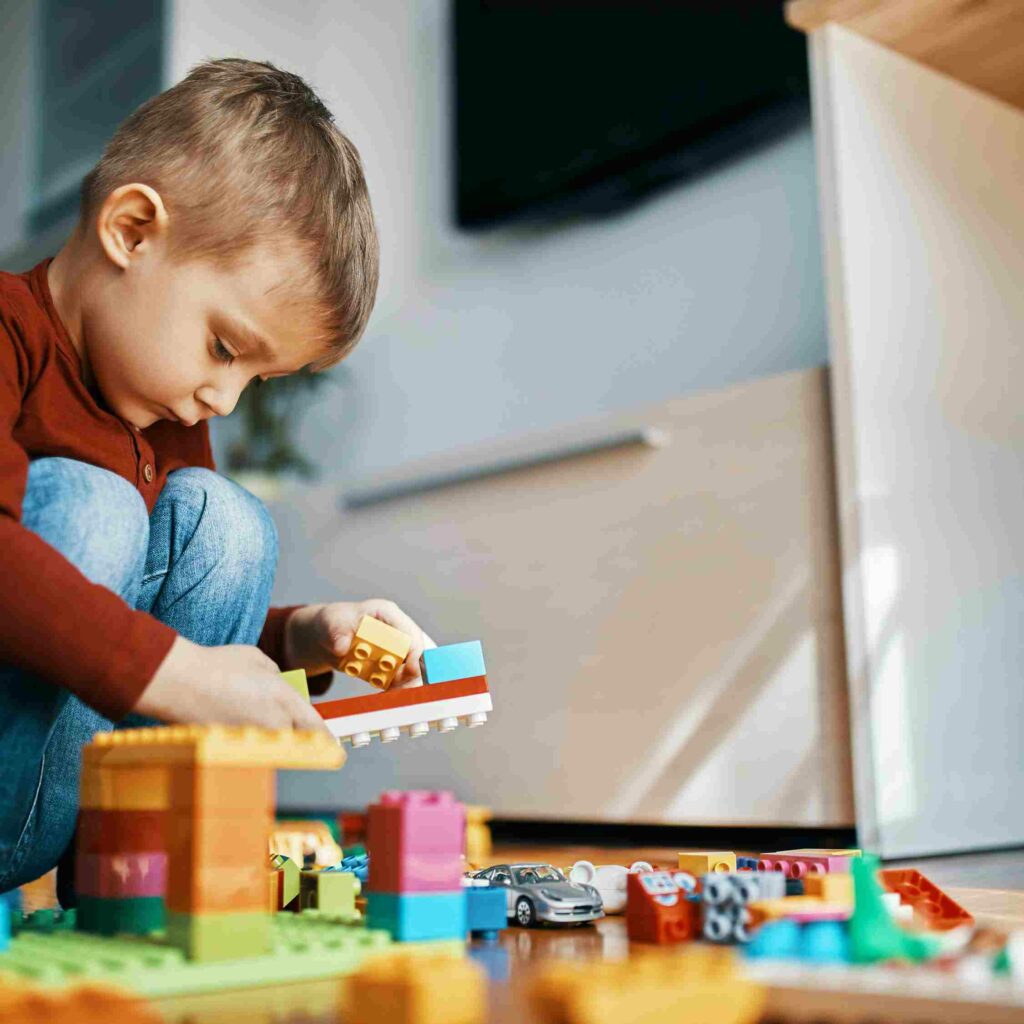If you have a child who seems to be excessively clean or overly worried about making mistakes, they may be suffering from OCD. OCD, or obsessive-compulsive disorder, is a mental health condition that can cause a lot of distress for both children and adults. In this blog post, we will discuss what triggers OCD in a child as well as some effective treatment options.
Contents
What Triggers OCD In A Child?
 OCD in a child seems to be brought on by many different factors. Also, this age group is more prone to develop OCD after a stressful event or trauma. It is important to understand what triggers OCD in a child in order to look out for early warning signs and get them to help if needed.
OCD in a child seems to be brought on by many different factors. Also, this age group is more prone to develop OCD after a stressful event or trauma. It is important to understand what triggers OCD in a child in order to look out for early warning signs and get them to help if needed.
There are many different things that can trigger OCD in a child. Some of the more common triggers include:
Family Genes
It is the prominent and at the same time, the most controversial theory. A child with OCD might have inherited it from a parent or grandparent who also suffers from the disorder. However, there are types of OCD that can develop in a person who does not have any family history of the disorder. A person with severe symptoms of OCD is believed to possess a second type of variation in the same gene.
In simple words, it can be said that family genes are one of the important factors that act as a trigger for OCD in a child. Moreover, twin studies suggest that if one identical twin has OCD, the other twin also has a fifty percent chance of developing the disorder.
Although it is precisely difficult to estimate the role of family genes, it is one of the most important causes that lead to OCD in a child. Also, if one of the parents has OCD then there are still the same chances, though a little less. There are many experts and counselors who are specialized in treating genetic OCD. With time, the help and studies, in this case, are developing.
Brain Functioning
The human brain is extremely complex. It is divided into various regions, each responsible for different functions. The frontal lobe region is responsible for planning and decision-making. On the other hand, the limbic system regulates emotions. The caudate nucleus and thalamus are two other regions that play an important role in controlling our thoughts and actions.
It has been observed that people suffering from OCD have an imbalance of serotonin levels in their brains. Serotonin is a neurotransmitter that helps in sending messages between different nerve cells. An imbalance of serotonin levels can lead to problems with mood, sleep, anxiety, and appetite.
It has also been observed that people with OCD have a higher level of activity in the caudate nucleus region as compared to those who don’t suffer from the disorder. The caudate nucleus is responsible for controlling our thoughts and actions.
But what triggers OCD in a child, has a simple answer- an imbalance in the brain. It is important to get a child’s brain checked if they are exhibiting any symptoms of OCD.
Environmental Factors
 A child’s environment also plays an important role in triggering OCD. If a child witnesses someone close to them, such as a parent or sibling, suffering from OCD, they are more likely to develop the disorder themselves.
A child’s environment also plays an important role in triggering OCD. If a child witnesses someone close to them, such as a parent or sibling, suffering from OCD, they are more likely to develop the disorder themselves.
Other environmental factors that can trigger OCD in a child include:
- Exposure to traumatic events
- Prolonged periods of stress
- Lack of sleep
It is important to create a supportive and loving environment for a child in order to prevent the development of OCD. Otherwise, it does not take long for a child’s OCD to spiral out of control.
Moreover, the obsessions and compulsive behaviors that are a part of OCD can be extremely distressing and time-consuming. So these causes environmental as well as physical should be taken care of, to prevent a child from developing OCD.
Behavioral And Cognitive Aspects
These are really important in the development of OCD. A child who is always neat and tidy, or one who likes things to be a certain way, is more likely to develop OCD. This is because they are more likely to have obsessive thoughts about dirt and germs, and will engage in compulsive behaviors such as washing their hands over and over again.
Cognitive aspects also play a role in triggering OCD in a child. For example, if a child is constantly being told that they are not good enough or that they need to be perfect, they are more likely to develop OCD.
This is because they will start to have obsessive thoughts about not being good enough, and will engage in compulsive behaviors such as seeking reassurance from others or checking things over and over again. It is important to be aware of the behavioral and cognitive aspects that can trigger OCD in a child. This is because they can be extremely distressing and time-consuming.
Consequences Of Triggers In A Child If Left Unidentified
If left unidentified and untreated, the consequences of triggers can be significant. Triggers can lead to a worsening of OCD symptoms, such as;
- Increased anxiety.
- Depression.
- Isolation.
- Problems at school or work.
- Relationship difficulties.
- Triggers can even lead to suicide.
It is very essential to identify the triggers of OCD in a child so that proper treatment can be given and the consequences avoided. Also, people need to understand that children with OCD are not lazy or attention-seeking, but they have a real mental illness that needs to be treated.
Moreover, it is important to know that OCD is not caused by bad parenting. There is no single cause of OCD, but various other factors can play a role. However, as a parent, you can help your child by providing support and understanding. You can also help them by taking actions to reduce stress in their life.
If anyone becomes able to identify what triggers OCD in a child, they become one step closer to helping their child recover.
Treatment Options If You Identify What Triggers OCD In A Child
 When you identify what triggers OCD in a child, you can begin to work on a treatment plan. While there is no one-size-fits-all solution, there are some common treatments that can be effective.
When you identify what triggers OCD in a child, you can begin to work on a treatment plan. While there is no one-size-fits-all solution, there are some common treatments that can be effective.
Cognitive-behavioral therapy (CBT)
It is a type of therapy that helps people change their thinking and behavior. It can be used to help children with OCD learn how to manage their obsessions and compulsions. CBT works very effectively while it is about treating OCD in a child. In fact, there have been studies that suggest that CBT is more effective than medication in treating OCD.
Exposure and response prevention (ERP)
This is a type of CBT that helps people face their fears and resist the urge to do their compulsions. It can be very helpful for children with OCD. Children who undergo ERP therapy learn to control their anxiety by gradually exposing themselves to the things they are afraid of and learning not to do their compulsions. More often, this is only the therapy that is necessary to help a child with OCD.
Family-based therapy (FBT)
This is a type of therapy that helps families get involved in the treatment of their child’s OCD. It can be very helpful because it teaches parents how to support their child and helps the whole family understand OCD. This type of therapy usually involves weekly sessions with a therapist. You can definitely try Mantra Care, which is an app based on numerous types of therapies. Mantra Care has a free trial and it’s definitely worth checking out!
Support groups
This is a place where people with OCD can share their experiences and support each other. This can be very helpful for children with OCD because it helps them feel less alone. It also helps families to understand that they are not the only ones dealing with this disorder. Moreover, it is a great way to learn about new treatments and get support from people who understand what you are going through.
Medication
 There are some types of medication that can be used to treat OCD, such as antidepressants, anti-anxiety medications, and antipsychotics. Medication can be very helpful for some children with OCD, but it is not a cure. In most cases, children will still need to receive therapy even while taking medication. However, medication is never the first option while treating OCD in children and should only be considered if other treatments have not been effective.
There are some types of medication that can be used to treat OCD, such as antidepressants, anti-anxiety medications, and antipsychotics. Medication can be very helpful for some children with OCD, but it is not a cure. In most cases, children will still need to receive therapy even while taking medication. However, medication is never the first option while treating OCD in children and should only be considered if other treatments have not been effective.
As you can see, there are many options available to help treat OCD in a child. It is important to work with a mental health professional to figure out what will be the best course of action for your child. Remember, you are not alone in this! There are many resources and people who can help.
Conclusion
To conclude, what triggers OCD in a child, is a very important question to ask when trying to understand the condition. There is no one answer that fits all children, as each case is unique. However, there are some common triggers that can be identified.
In fact, OCD in a child can be very distressing, and it is important to get the right treatment. If you think your child may have OCD, it is important to speak to a professional. They will be able to assess your child and provide the best course of treatment. However, the treatment can vary depending on the severity of the condition.
If you are looking for affordable Online OCD Counseling MantraCare can help: Book a trial OCD therapy session


